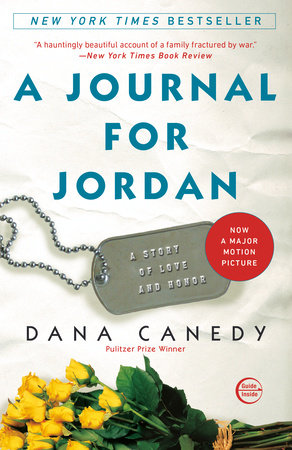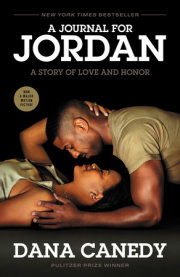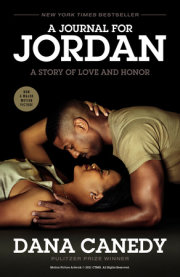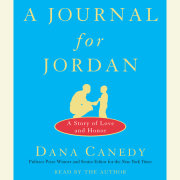OneDear Jordan,
If you are reading this book, it means that we got through the sorrowful years, somehow, and that you are old enough to understand all that I am about to tell you.
You are just ten months old now, but I am writing this for the young man you will be. By then, you will know that your father was a highly decorated soldier who was killed in combat in October 2006, when a bomb exploded beneath his armored vehicle in Iraq. You were six months old.
You will know that he left a journal for you, more than two hundred pages long, which he handwrote in neat block letters in that hot, terrifying place. What I want to tell you is how the journal came to be and what it leaves unsaid about your father and our abiding love.
Before he kissed my swollen stomach and left for the war in December 2005, your father, U.S. Army First Sergeant Charles Monroe King, had been preparing for the promise of your new life and for the possible end of his own. Even before he boarded that plane headed for danger, I worried that he would be killed. So I gave him a journal. I hoped he would write a few messages, perhaps some words of encouragement to you, though you were not yet born, in case he died before you knew each other.
We did a lot to prepare for the possibility that your father would miss out on your life, including finding out if you were a boy or a girl before he left; he was thrilled to have an image of you in his mind and kept your sonogram pictures in a pocket in his uniform the whole time he was in Iraq.
And then there was the journal. Writing it would be a way for your dad to help guide you through life if he did not make it home to us. He wanted you to know to pick up the check on a date, to take plenty of pictures on vacations, to have a strong work ethic, and to pay your bills on time. He wanted to tell you how to deal with disappointment, to understand the difference between love and lust, to remember to get on your knees and pray every day. Most of all, he wanted you to know how much he loved us.
So, late into the night in Iraq, after he had completed dangerous and often deadly missions, your dad returned hungry and exhausted to the relative calm of his room and wrote to you before he slept. His grammar was not perfect and his handwriting at times suggested that he was tired or rushed. But he put so much thought into the beautiful messages he wrote, things like:
Be humble about your accomplishments, work harder than the man next to you, it is all right for boys to cry. Sometimes crying can release a lot of pain and stress. Never be ashamed to cry. It has nothing to do with your manhood.Your father mailed the journal to me in July 2006, shortly after one of his young soldiers was killed in an explosion eerily similar to the one that would claim his own life. He was so shaken after pulling the young man’s body, piece by piece, out of a bombed tank that he sent the journal to me, unfinished. He had more to say, but that would have to wait until he came home on a two-week leave to meet you, six weeks before he died.
I read the journal in the calm of night on the day it arrived, with you sleeping next to me, and fell in love with my gentle warrior all over again. He was the most honorable man I have ever known, and the most complex. I do not want to portray your dad as a saint whose example you could never live up to. He was not. He was gentle, benevolent, and loyal, but he could also be moody, stubborn, and withholding. He would brood for days over a perceived slight, like the time I spent my birthday with my sisters and girlfriends instead of with him. He put his military service ahead of his family.
I also want you to understand me—an imperfect woman who deeply loved her man but struggled during our long courtship to accept him as he was. We were together for the better part of a decade, half of which he spent waiting for me to fall in love with him. Truth be told, every girl has an image of the man with whom she will walk down the aisle one day, and he was not the groom I had imagined. He was excruciatingly introverted, a procrastinator, and got his news, God forgive him, from television instead of the
New York Times, where I have worked as a journalist for more than eleven years.
I am loquacious, assertive, and impatient, which mostly amused your father but sometimes annoyed him. I am also obstinate and impulsive. My weight fluctuates when I am stressed. I curse in traffic.
I had a demanding career as a reporter when I met your father, while he was away for months at a time in the wilderness, training young men for battle. A former drill sergeant, he had a strong sense of duty. He was so devoted to his troops, many just out of high school, that he bailed them out of jail, taught them to balance their checkbooks, and even advised them about birth control. I learned to live with his long silences and ambivalence toward newspapers. But I struggled to understand what motivated the man who had for so long dreamed of your birth but chose to miss it because he believed his soldiers needed him more. He refused to take his leave from Iraq until all 105 of his men had gone home first.
Your father was bound to the military not only by a sense of duty, but because it had expanded his world. The soldiers he trained, and trained with, came from coal mining towns in West Virginia, the Bronx in New York City, seaside villages in Puerto Rico. He met former surfers, men who shared his love for the Bible, and women he revered for excelling in a male-dominated institution. He traveled through Europe while stationed in Germany. He practiced his Spanish while working with Cuban refugees at Guantanamo Bay. He wrote in the journal:
Enlisting in the army was one of the best decisions I had ever made in my life. God blessed me above all I could imagine. Like anything, you have some challenging days, but when I look back I have no regrets. The army even recognized my artistic abilities. I also met a lot of great people. It’s been an awesome experience. Thanks, God.But those were peacetime experiences. The military had also introduced Charles to killing and death. The sight of blood gave him flashbacks. Chemical sprays he received during the First Gulf War left permanent splotches on his arms. For years he was haunted by images of combat, unable to speak about them even to me.
During his final tour of duty, he experienced loss of the worst kind. His goal was to bring every one of his men home alive; he even made that promise to many of their wives. It was a vow he could not keep. Still, he never questioned the rightness of a single mission. For Charles, the war was not about “weapons of mass destruction” or an “axis of evil”; I never heard him speak those words. It was about leading the soldiers he had trained by example, about honor and dignity, and about protecting a country he loved from enemies real or imagined.
I am proud of your dad’s honor and dignity—even of the way he died. Son, all of us will leave this world, but so few die a hero’s death.
Still, the would-be wife and new mother in me are angry at times that he left us so early, at the age of forty-eight. Was it heroic or foolish that he volunteered for the mission that killed him?
As the daughter of an army veteran, I grew up on or near military bases and after I left for college wanted no more of that life. So for years I resisted getting deeply involved with your father, and much of our long-distance romance involved him chasing me and me pushing him away. We dated other people at times, me out of a fear of committing to your father, him out of frustration with my dithering. Ultimately, it was his steadiness, his character, and his sureness about who he was and what he stood for that won me over, something you will get to know by reading the journal.
Copyright © 2008 by Dana Canedy. All rights reserved. No part of this excerpt may be reproduced or reprinted without permission in writing from the publisher.








